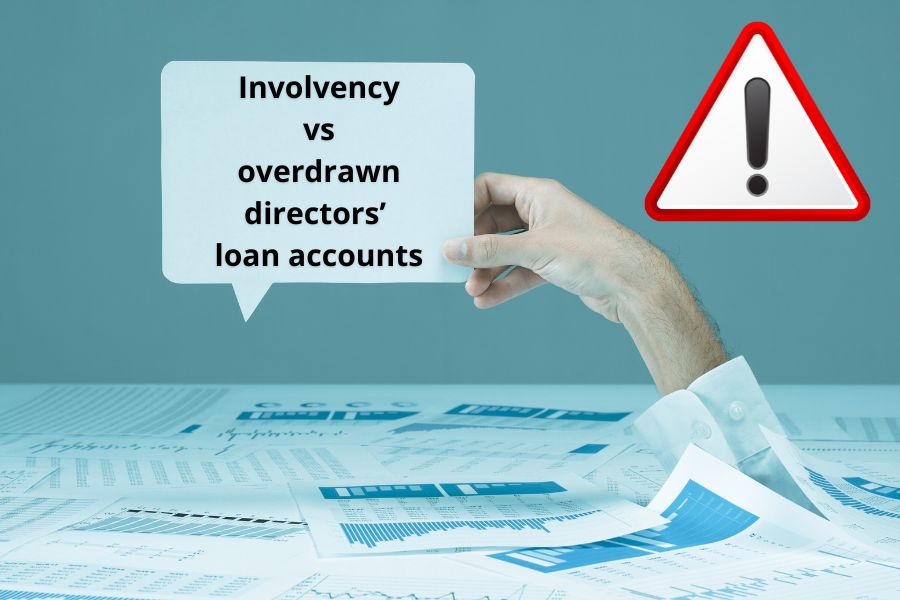In this guest article, Danny Allen, Partner at 360 Insolvency discusses how to approach overdrawn DLAs when your business is in trouble.
An issue we often see with SME businesses facing financial distress is the existence of an overdrawn director’s loan account (“DLA”).
The DLA is a common feature of most SME balance sheets and is commonly used to record a director’s drawings during a financial year, with adjustments made at year end in the most tax efficient way by allocating values to the director’s salary, dividend and loan, depending on profits generated. Straightforward, common and not particularly complicated, but what happens when the business starts to struggle and even has to call it a day?
How the DLA is treated
Having recognised a problem with the business, the responsible director will usually go to their accountant to seek advice and may be referred to a licensed insolvency practitioner (“IP”) who will advise the director on their role and duties to the creditors and to make sure that he or she complies with legislation and fiduciary duties as a director.
This is important, as the usual allocation of drawings, salary and dividend cannot now happen if the Company is insolvent or is facing insolvency, because allocating the DLA to salary may prejudice other creditors. For example, converting a loan to salary to cover “back pay” will generate an HMRC liability for PAYE/NIC, which the Company will not be able to pay, and it can’t be allocated to dividends if the Company does not have distributable reserves (which presumably, it won’t). The effect of reclassifying also deprives other creditors of an asset in which they would otherwise had the opportunity to recover some of their loss; this is an offence known as a ‘preference’ and could lead to further sanctions that impact on future business activity.
As unfair as it may seem while the director has to watch their life’s work unravel, the simple analysis is that a DLA is an asset, which the IP (as liquidator) is duty bound to try to recover.
The IP cannot ‘help’ the director resolve a DLA issue as they must remain independent, but they can explain how it will be treated in the liquidation and may be able to signpost towards things to think about, or point you to other advisers.
Once appointed the IP will conduct a reconciliation and make request for payment.
At this stage the best approach is to take personal advice and engage with the process. A liquidator will usually be open to discussing a settlement rather than having to incur the cost of pursuing the debt through the Courts; a lump sum “one off” settlement, payment over time and/or some other arrangement, such as taking security over property may well be appropriate.
There is no single formula for this and the liquidator will consider any offer on disclosure around the director’s income and expenditure, assets and liabilities.
This may sound uncomfortable for the business owner, already facing uncertainty and upset about their business, but ignoring a demand could lead to fairly rapid escalation to proceedings being issued.
Make sure any settlement you agree to is achievable and realistic – there is no point promising and not delivering.
Something to be aware of is that if a settlement is agreed that forgives or writes off a portion of the DLA, then HMRC can treat the money as income and raise a tax charge – think about this when reaching terms.
Forward thinking
Sometimes a business will fail as a result of an unforeseen catastrophic event; a bad debt or loss of custom which may be hard to predict, but there are steps directors can take to mitigate the impact of a DLA:
- Knowledge is key. The mere existence of an overdrawn DLA may mean that the business is simply not generating enough profit to allocate drawings to dividend… does that mean it is not performing well enough to pay you what you need? Is this is a red flag for viability generally? Take a good hard look at things and talk to your accountant. Review the DLA and your accounts regularly – not just at year-end or when it’s too late. Make sure your bookkeeping is up to date and if that is something you are not confident in, treat costs associated with doing so as an investment. You should know how much you owe and how your company is performing at any given time.
- Try to keep personal and business finances separate – your company’s cash isn’t yours until it’s taken out properly and using the company card to pay for holidays and the weekly shop is just inflating the DLA.
- Do make sure you are reclaiming legitimate expenditure – talk to your accountant.
- Look at the accountant relationship – are you with them because your Dad used them for 40 years or because they are attuned to you and your business and take a real interest? How often do you meet, what service levels do you have with them and, ultimately, can their offering match what you need?
- Plan how you take money out – salary, dividends, or loans. Your accountant will be able to advise here and whilst the inclination is to use the most tax efficient structure, a reasonable salary is much harder to challenge than an illegal dividend.
- Understand your personal finances – what will happen if you receive a demand from a liquidator – can you afford to repay, do you have assets you could sell?
Summary
In distressed scenarios, an overdrawn DLA can be a real issue for the SME director which may be unavoidable in some circumstances, though we do see plenty that could have worked out differently with some forward planning. Be informed and take advice.
Use of this information is for reference only. Specialist Accounting Solutions Ltd accepts no liability for any errors therein or any losses or damages arising from it.
Author of this article Danny Allen is is Director of 360 Insolvency Limited, and licensed to act as an Insolvency Practitioner in the United Kingdom by the Institute of Chartered Accountants in England and Wales (ICAEW).




